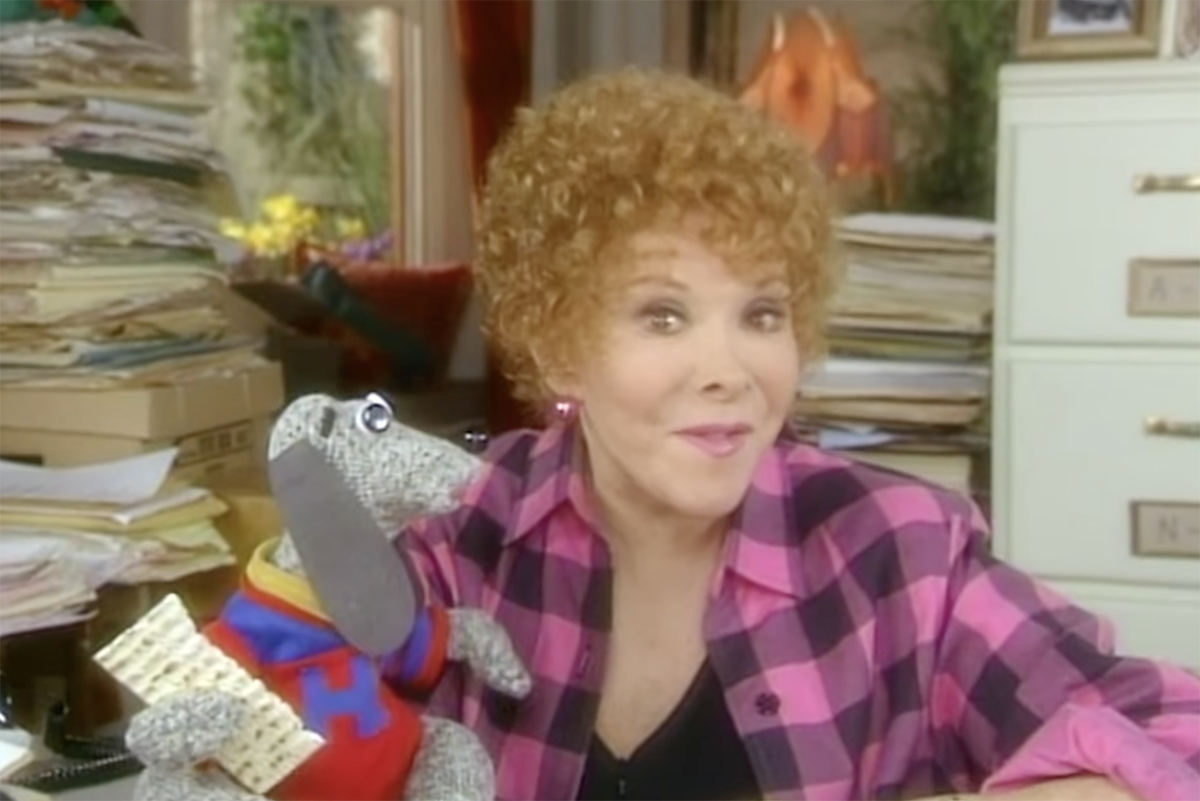Listen, when it comes to Passover TV, I know that “A Rugrats Passover” reigns supreme in many minds. I personally grew up on the elite Passover special of the Israeli kids’ show “Parpar Nechmad.” But this year, I rewatched Shari Lewis’ “Lamb Chop’s Passover Surprise,” and I think it might take the (kosher for Passover) cake.
The special, which aired on PBS in 1996 and was funded in part by the Covenant Foundation and the Lear Family Foundation, deserves the title of best kids’ Passover special merely because of the sheer amount and quality of original Passover songs. Shari, Lamb Chop, Hush Puppy, Charlie Horse and special guests Dom DeLuise and Robert Guillaume each break into song at least once. Puppet Hush Puppy opens the episode with a terribly endearing number about lots and lotsa matzah in which he juggles the unleavened bread (he also looks really cute later reading and singing from the haggadah while wearing a kippah).
Not only are these songs infectious, they are so, so educational while still being totally enjoyable. There’s so much Passover teaching going on, quite a bit of repetition for it to sink through with even the youngest viewers and still so much silly fun for the older kids. Lamb Chop sweetly sings all the four questions in English. DeLuise has Shari explain the meaning of each symbolic food on the seder plate and the two dance to a klezmer tune. Guillaume, star of “Benson” and iconic voice of Rafiki in “The Lion King,” sings a very trippy and excellent song about Pharaoh and plagues. Answering questions from curious kids at the seder table, he also talks about the Black American experience of slavery and about how not only Black people have been slaves throughout the centuries and millennia. He talks about the fact that not all Jews are white, though there are plenty of white Jews (Lamb Chop exclaims that she is a white Jew, while Charlie Horse says he is palomino).
Of course, the episode has a story arc that isn’t merely about preparing for and holding a seder, though these actions are at the center of the almost hour-long special. Charlie Horse, in hopes of becoming class president, tries to convince his classmate with false promises (such as: your parents won’t tell you what to do, you won’t have to wash hands and eat vegetable during school lunch and you’ll be able to drive a car!), and tries to bribe the class to vote for him by inviting them to a meal with his new famous neighbor, Guillaume. He keeps his scheme a secret from Shari, and when Shari tells him she’s too busy finishing her book to host the Passover seder, he asks her to let the kids — meaning him, Lamb Chop and Hush Puppy, put together the meal themselves.
When the three struggle to make a simple matzah ball soup (Hush Puppy eats the egg and matzah meal mixture before it can be boiled, and thinks they need to make a soup for a chicken, not with chicken in it), they recruits DeLuise to help them — seeing the iconic comedian waltz into the house while singing “nothing could be greater than to be a baked potato at a seder,” and pulling up his chef’s hat to show a yarmulke underneath are some of the highlights of the episode. Alan Thicke also has a special guest spot in this special, as he did in the Hanukkah one, but he plays himself, and causes a kitchen disaster that gets him kicked out of the episode.
Through the whole episode, we get a lot of details about the story of Exodus, the customs of Passover and also so many of those wonderful jokes and gags that Lewis is known for, along with her incredible singing and puppetry. And if that’s not enough (dayenu!) the episode also features Lamb Chop’s adorable and very real kitten friend to whom the iconic sheep puppet sings the four questions — she doesn’t answer them, though, since that’s the grown ups’ job, but she does hope one day to sing them to her own children. The feline later shows up instead of the prophet Elijah.
We do get a pretty full seder, which includes, obviously, a very tense afikomen search. The race is unfortunately rigged in favor of Hush Puppy, who has the superior sense of smell.
As for Charlie Horse? He learns an important lesson about leadership in the episode from, who else? Moses. He apologizes to Shari for his wrongdoings and concedes the presidential race to the more qualified candidate, who he may or may not have a crush on. As the end credits roll, Lewis sings a wonderful version of “Dayenu,” which she explains means “it would have been enough,” and well, this episode is definitely more than enough — a gift that keeps giving almost three decades later. It’s truly still so enjoyable, funny and heartwarming, and it’s all thanks to the Jewish woman from the Bronx who became one of America’s most iconic children’s entertainers. May Shari Lewis’ memory be for a blessing.








